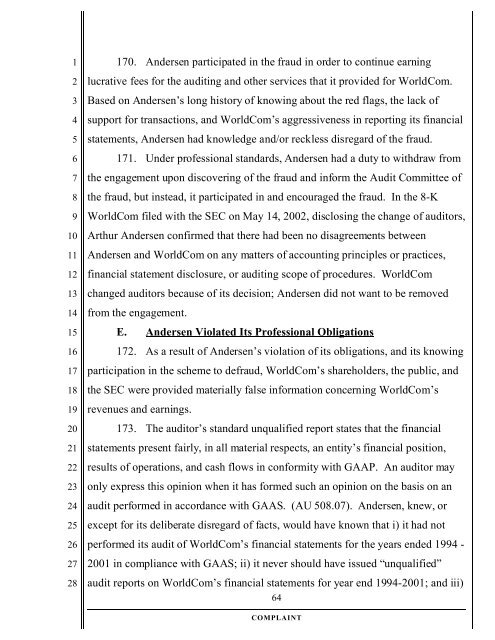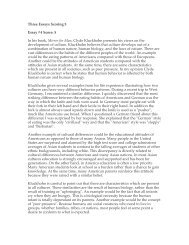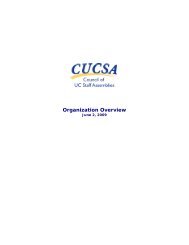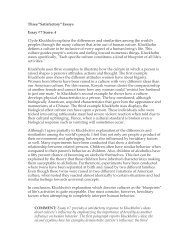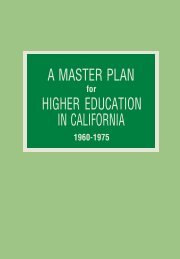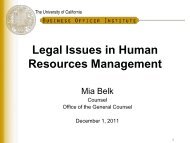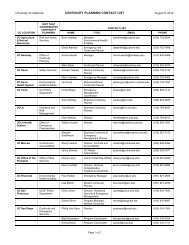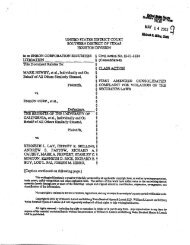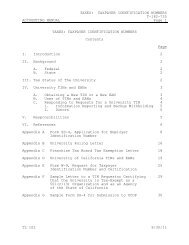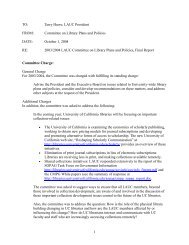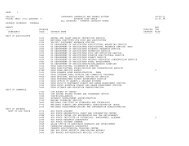The Regents - University of California | Office of The President
The Regents - University of California | Office of The President
The Regents - University of California | Office of The President
You also want an ePaper? Increase the reach of your titles
YUMPU automatically turns print PDFs into web optimized ePapers that Google loves.
1<br />
2<br />
3<br />
4<br />
5<br />
6<br />
7<br />
8<br />
9<br />
10<br />
11<br />
12<br />
13<br />
14<br />
15<br />
16<br />
17<br />
18<br />
19<br />
20<br />
21<br />
22<br />
23<br />
24<br />
25<br />
26<br />
27<br />
28<br />
170. Andersen participated in the fraud in order to continue earning<br />
lucrative fees for the auditing and other services that it provided for WorldCom.<br />
Based on Andersen’s long history <strong>of</strong> knowing about the red flags, the lack <strong>of</strong><br />
support for transactions, and WorldCom’s aggressiveness in reporting its financial<br />
statements, Andersen had knowledge and/or reckless disregard <strong>of</strong> the fraud.<br />
171. Under pr<strong>of</strong>essional standards, Andersen had a duty to withdraw from<br />
the engagement upon discovering <strong>of</strong> the fraud and inform the Audit Committee <strong>of</strong><br />
the fraud, but instead, it participated in and encouraged the fraud. In the 8-K<br />
WorldCom filed with the SEC on May 14, 2002, disclosing the change <strong>of</strong> auditors,<br />
Arthur Andersen confirmed that there had been no disagreements between<br />
Andersen and WorldCom on any matters <strong>of</strong> accounting principles or practices,<br />
financial statement disclosure, or auditing scope <strong>of</strong> procedures. WorldCom<br />
changed auditors because <strong>of</strong> its decision; Andersen did not want to be removed<br />
from the engagement.<br />
E. Andersen Violated Its Pr<strong>of</strong>essional Obligations<br />
172. As a result <strong>of</strong> Andersen’s violation <strong>of</strong> its obligations, and its knowing<br />
participation in the scheme to defraud, WorldCom’s shareholders, the public, and<br />
the SEC were provided materially false information concerning WorldCom’s<br />
revenues and earnings.<br />
173. <strong>The</strong> auditor’s standard unqualified report states that the financial<br />
statements present fairly, in all material respects, an entity’s financial position,<br />
results <strong>of</strong> operations, and cash flows in conformity with GAAP. An auditor may<br />
only express this opinion when it has formed such an opinion on the basis on an<br />
audit performed in accordance with GAAS. (AU 508.07). Andersen, knew, or<br />
except for its deliberate disregard <strong>of</strong> facts, would have known that i) it had not<br />
performed its audit <strong>of</strong> WorldCom’s financial statements for the years ended 1994 -<br />
2001 in compliance with GAAS; ii) it never should have issued “unqualified”<br />
audit reports on WorldCom’s financial statements for year end 1994-2001; and iii)<br />
64<br />
COMPLAINT


